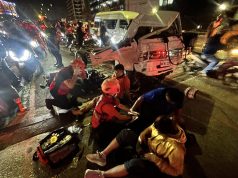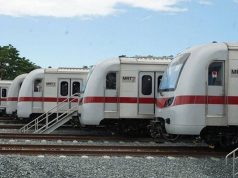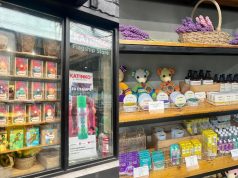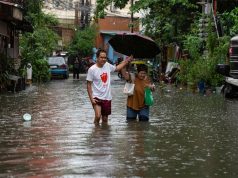
QUEZON CITY — Anabelle Elmedo lived for years with her family of six in an informal settlement in Quezon City in the Philippines, and had few worries beyond the daily grind, until she received an eviction notice.
Elmedo and hundreds others were declared encroachers on public land, and given a choice: move to a resettlement area miles away, or build and own their homes, nearby, under a state-backed programme with the charity Habitat for Humanity.
Elmedo chose the option of building and owning a home, and her family put in 500 hours over six months to lay bricks, cart sand and host volunteers who worked alongside residents.
“I have peace of mind now because I have a title to my home and know I can’t be evicted,” said Elmedo, 39, who moved into her two-room home six years ago.
“We have better facilities and security here, a real community, and my children can inherit our home after we pass on – it is something we can leave for them,” she said.
About 4.5 million people are homeless or living in informal settlements in the Philippines, with its population of about 106 million, according to the statistics office.
About 3 million of them are in Metro Manila, possibly the most in any urban area in the world, charities estimate.
Many are in Quezon City, which lies within Metro Manila, and are mostly migrants from the provinces who come in search of better opportunities.
Others have been forced out of their homes by industrial projects in one of the fastest growing economies in the world.
“People are losing lands and homes as a result of expansion of highways and industries in rural areas,” said J.P. Lapid at the non-profit Urban Poor Resource Centre of the Philippines.
“They are moving to urban areas and are forced to occupy spaces that pose risks to their health and safety, and where they constantly face the risk of eviction,” he said.
Tenure Security
A critical shortage of affordable housing affects many other Asian countries too.
About half a billion people live in informal settlements in cities in the region, as the pace of urbanization quickens, according to the lobby group Asian Coalition of Housing Rights.
Settlers usually have few choices but to move when they are evicted, and relocation is typically to distant suburbs. Many people instead prefer informal settlements in cities.
In the Philippines, this has led to nearly 115,000 units of public housing lying empty in rural areas.
Over the years, people across Asia have organized themselves into community groups in order to secure tenure through community finance.
At the same time, governments realized that resettlement in locations far from jobs and services is not feasible, said Marlon Manuel, an adviser to the legal advocacy group Namati.
“You need different approaches, with some in-situ development, some in-city relocation and some outside the city,” he said.
“For this to work you need the participation of the government, the private sector and non-profits,” he said.
Officials in Manila aim to resettle some 100,000 families living in shacks by canals and rivers regarded as “danger zones” within the city, with the participation of communities and the private sector.
Some of the financing will be through community mortgage programmes, where residents get cheap loans and make monthly payments for 25 years each.
Some of the in-situ and off-site development will be done by private firms and charities such as Habitat and the Philipines-based Gawad Kalinga.
At Gawad Kalinga’s Enchanted Farm in Bulacan, about 40 km (25 miles) north of Manila, 50 families built their own two-room homes on land leased from the local government.
The residents each put in 500 hours of so-called “sweat-equity” for their homes in a site that also includes livelihood opportunities to keep them from moving back to the city for jobs, said Joni Morales, a manager at Gawad Kalinga.
“These are people who once lived in slums in Manila and in cemeteries in Cebu,” she told the Thomson Reuters Foundation.
“They now live in their own homes and have security of tenure.”
Modest Amounts
Those living in tenements seldom have access to bank loans and often lack the means to make mortgage payments.
While credit unions and micro-finance initiatives have helped fund small businesses, homes require more capital.
Community finance — which includes savings, as well as contributions from development agencies and the government – is helping address housing finance needs in countries including Thailand, Cambodia, Nepal, Sri Lanka and the Philippines.
In the Philippines, community mortgage programmes backed by the federal government have benefited some 250,000 slum-dwellers since 1989, according to official data.
“Community finance provides access to much-needed loans on agreeable terms, in an immediate, flexible, unbureaucratic process,” said Somsook Boonyabancha, founder of ACHR in Bangkok.
“Even low-income communities can bring about enormous change in their lives and in their communities and cities, cheaply, effectively and at scale, with only modest amounts of finance.”
Habitat’s Bistekville project in Quezon City, where Elmedo and more than 300 other families live, was the first social housing project backed by the local government, for row houses of 28 sq mt (301 sq ft) each.
The project, which aims to have nearly 700 homes, was funded through a community mortgage programme, with residents paying a monthly amortisation of up to 2,000 Philippine pesos ($38). They all received titles.
Residents include public school teachers, call centre workers, small business owners and tricycle taxi drivers. They share a community hall, and have added a fence and a security guard.
On a recent weekday afternoon, Elmedo chatted with her neighbour, who runs a small shop in her home selling snacks, soap and top-up cards for mobiles.
“We did not think we could ever own a home in Quezon City,” said Elmedo, who makes and sells rugs and place mats.
“It is a good feeling,” she said. — Reporting by Rina Chandran @rinachandran, Editing by Jared Ferrie









